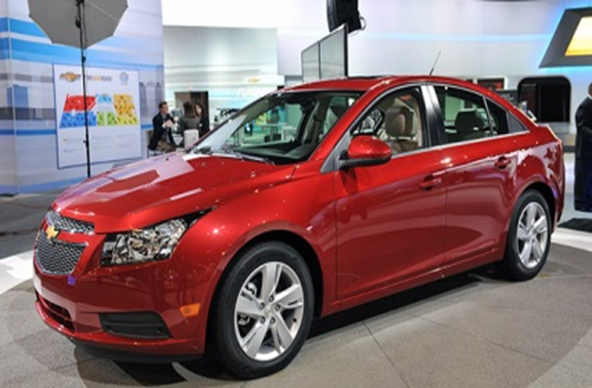Just in time for Earth Day, General Motors‘ Chevrolet division says that the clean-diesel version of its Cruze sedan coming out this year will get 46 mpg in highway driving, four more miles per gallon than it projected last February.
The announcement is important for Chevrolet because exceptionally high fueleconomy ratings tend to get the attention of buyers, and, say auto industry analysts, convey quality and technical prowess to consumers. The diesel Cruze is rated at 27mpg in city driving, and 33 mpg in mixed driving.
The highway rating is important, as many who grind a lot of highway miles are attracted to such high ratings. How does the diesel Cruze compare with the Toyota Prius Hybrid? The Prius gets 51 mpg city and 48mpg highway. The Prius costs $24,200. The Cruze diesel costs $24, 885.
While “clean diesel” vehicles are common in Europe, they have been slow to catch on the U.S. These vehicles, sold mostly in the U.S. by German automakers Volkswagen,Audi, BMW and Mercedes, can get between 25% to 35% better fuel economy than gasoline counterparts. But diesel fuel can be, and usually is, more expensive than gasoline, making it a tough sell to many buyers. Diesel cars also typically carry a price premium, too, of around $2,500-$3,000.
Automakers are bringing out more clean diesel vehicles in the hopes that consumers come around. Selling more more diesel vehicles will help automakers achieve the 54.5 Corporate Average Fuel Economy standard set by the government, which has to be reached by 2020 unless it gets rolled back by Congress and the next White House administration.
Besides Chevy, Mazda is launching a clean diesel version of the Mazda6 this year. Audi, BMW and Mercedes are launching additional diesel models. Volkswagen builds its Passat sedan in Tennessee now, and between 40% and 50% of the production is diesel-powered versions sold under the Passat brand.
The Benefits of Diesel
For drivers, fuel economy is not the only benefit. Diesel engines are incredibly durable. It’s not uncommon for diesel engines to last well beyond 200,000 miles with only normal maintenance. Additionally, diesel drive-trains provide great low-end torque (the power available to the engine at low revs), and they make a four-cylinder engine feel like they deliver the power of a six-cylinder.
GM isn’t looking for big volume for the Cruze diesel. It is more of a “test-the-water” venture to see how customers respond. Success could But nudge the maker to add more diesels, says Mark Reuss, president of North American Operations. “There is, fundamentally, a place for diesel here,” he said.
Because Chevy is such a high-volume car seller, the launch of the diesel Cruze could be a game changer on engine and fuel technology that too few U.S. car buyers understand. “Without a doubt, 2013 is the most exciting and important year in the history of clean diesel autos in the U.S.,” says Allen Schaeffer, executive director of the Diesel Technology Forum, an industry trade group based in Washington, D.C.
Whether Chevy’s brand power really does boost consumer acceptance is hard to predict. Chevy was first to market with an extended range electric vehicle, the Volt, and sales have been disappointing.



